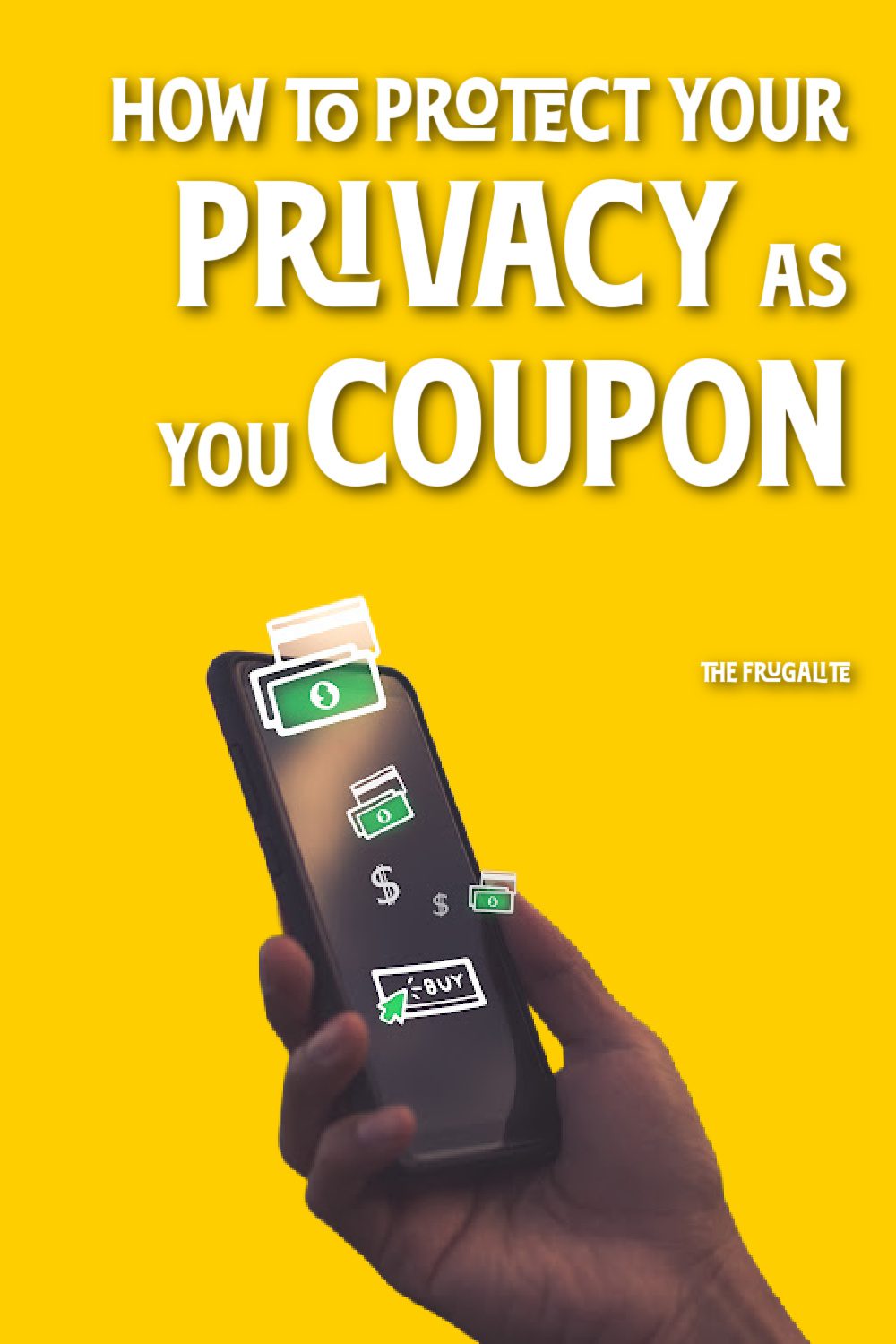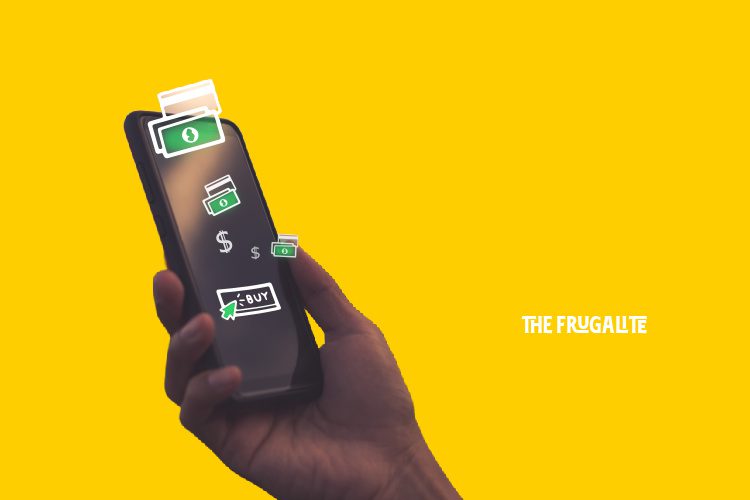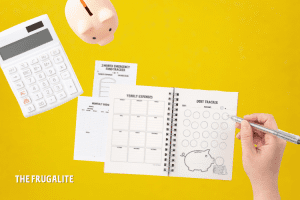(Psst: The FTC wants me to remind you that this website contains affiliate links. That means if you make a purchase from a link you click on, I might receive a small commission. This does not increase the price you’ll pay for that item nor does it decrease the awesomeness of the item. ~ Daisy)
By the author of What School Should Have Taught You and The Prepper’s Guide to Post-Disaster Communications
Don’t you hate it when you’re browsing the internet and something you just saved an online coupon code for or shopped for begins to pop up everywhere you go? If you’d like to prevent that and maintain more privacy, read on.
While couponing can be a great way for the Frugalite to save money, one also has to be vigilant about protecting their privacy. If you want to protect your privacy as you coupon, do you have any options? Can you get coupons that don’t require you to enter a host of personal information to be sold to third parties?
Let’s take a look…
Turn off your location settings on your phone.
A number of online coupon sites explicitly state in their privacy policies that they will collect your current GPS coordinates as well as time of day should you access their sites from your phone. Turning off your location settings is one of the ways that you can help to prevent this.
Do not interact with coupon sites through your social media.
Don’t do this in any way, shape, or form. Don’t use social media to log in with these sites, don’t visit their social media pages, and don’t attach your social media info to your coupon site info in any way. The privacy policies of some of these sites gives them explicit permission to scrape your social media accounts for your information.
Sunday newspapers
This is the low-hanging fruit here. If you walk up to a newspaper box on a Sunday, put in your $1.50 in quarters, and walk away with a newspaper in your hand, literally no one will know it was you that purchased that paper.
You’ll also walk away with the innards of your paper being filled with coupons for your community. This is an easy way to make sure that you’ll be able to save a bit of money without having given a lot of your purchase history, your address, or your spending habits to data harvesters.
Use a VPN when you’re online.
A lot of the coupon websites that you’ll find online use your ISP address to determine where it is that you live so that they can then determine which coupons they have that are applicable to your area. While you want to know which coupons are available for your area, you don’t want to give away your ISP address.
Using a VPN helps to mask this. Almost always, a coupon site will then allow you to manually enter your location so that you can search for the local coupons that way as well. By doing this, you are still able to find the coupons for your local Chik-fil-A, but you don’t have to tell anybody out there that “Hey! This person at this ISP address, who we know is John Brown (because John Brown’s credit card number is attached to the MAC address of the computer that logged onto this ISP address), really likes Chik-fil-A!”
“According to the data we’ve collected from 50 billion other Chick-fil-A sales, we know that this is likely what this person believes, these are the stores this person likely goes to, and this is probably the family history of this person. Let’s use all that to tailor-make our advertising for this person with all of those variables in mind.”
Use a “throwaway email” for newsletters.
Many stores offer weekly email blasts that alert you to what the current sales are. Many of these newsletters will also contain promo codes that you can use during online shopping. While online shopping faces its own hurdle of privacy concerns that are best covered by Michael Bazzel, by at least using a throwaway email you help to make sure that all promotional-style emails are sent to an account that is solely used for that purpose, and identifiable information is kept to a minimum.
A lot of people will use disposable email addresses to receive an email from a store, collect the email, and then trash that email address. They now have the promo code they wanted, and the store won’t be able to sell the email address information to any third parties to any real effect.
This is a great way to keep your inbox from being blasted with spam, from protecting your “real” email address, and keep data harvesters from collecting information from you via buying information tied between you and your email address.
Coupon books
I’ve written about this a bit in the past. If it’s paper and it’s in person, you’ve done a great deal in protecting your privacy.
Search for publicly listed promo codes
One of the problems that you’ve likely noticed with a lot of online coupon sites is that they say that they have a coupon code for whatever it is that you’re interested in purchasing, but then they want you to list a whole bunch of personal information to be able to view it.
If you don’t feel like creating an account with each one of these websites, one of the things that you can do is solely search for the publicly listed promo codes. These are the codes that anyone can see, and you don’t have to fill out any forms for. They’re not as prevalent as the “sign up” promo codes, but they are out there.
CouponCodes.com is a good place I’ve found to look for these publicly listed codes.
When it comes to the privately listed promo codes that you need to have an account to access, you’re likely going to want to create an account that isn’t traceable to your actual person. A throwaway email is most certainly a part of this. Michael Bazzel covers the subject of creating anonymous accounts in his book Extreme Privacy.
What are your thoughts on protecting your privacy as you coupon?
I should note that these aren’t guarantees for anonymity. A lot goes into that. But, these are ways that you will be able to keep yourself from volunteering so much information.
Are there other tips and tricks you think people should know? Let us know in the comment section below.
About Aden
Aden Tate is a regular contributor to TheOrganicPrepper.com and TheFrugalite.com. Aden runs a micro-farm where he raises dairy goats, a pig, honeybees, meat chickens, laying chickens, tomatoes, mushrooms, and greens. Aden has four published books, What School Should Have Taught You, The Faithful Prepper, An Arm and a Leg, The Prepper’s Guide to Post-Disaster Communications, and Zombie Choices. You can find his podcast The Last American on Preppers’ Broadcasting Network.












1 thought on “How to Protect Your Privacy as You Coupon”
Maintaining one’s privacy in this day and age involves many other venues in addition to the couponing data collection racket. One of the best instructors to teach people how to maintain their privacy in very many arenas is Glenn Meder who created the privacyactionplan.com several years ago … just this Spring renamed as
https://privacyacademy.com/
There is a long list of topics that his courses cover. From knowing when and why to freeze one’s credit with the big three credit agencies to choosing not only which cell phones (with a privacy-compliant operating system) and the service provider with similar abilities to how to set up multiple substitute charge card numbers that can only be used by the vendors you select. Some search engines are privacy protection oriented but many of the several hundred are not. There are many VPN providers with similar problems to learn about and avoid. Even some browsers are notoriously difficult to maintain privacy and using a vetted password manager instead of any browser’s built-in system has some good reasoning here, Etc, etc.
I strongly recommend looking over that website and subscribing to his newsletter.
–Lewis